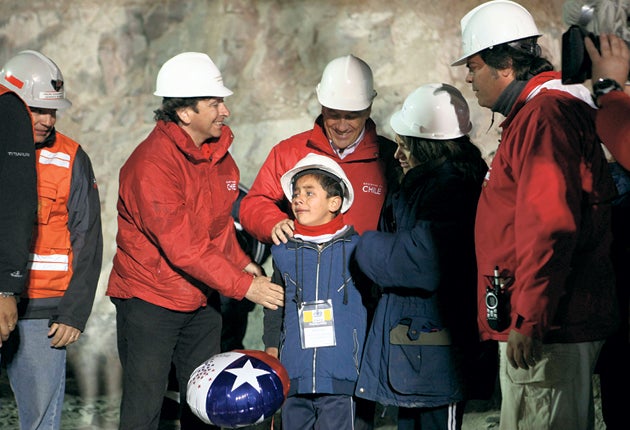'This was the most compellingly upbeat story since the lunar landings. It was a rare privilege to be there to watch it unfold'
Miners and politicians alike deserve all the plaudits coming their way, says Guy Adams, the IoS correspondent at Camp Hope

It was the little boy who did it for me. Bairon Avalos, seven years old, crying buckets as it finally dawned on him that, yes, Daddy really was coming home. When he ran up to greet his father, Florencio, the first of the 33 miners to step out of the metal cage, it really did feel like the whole of Chile was weeping with him.
We watched on a big screen, rigged up against the side of the canteen tent in Camp Hope, maybe 500 yards from the rocky patch of desert where this human drama was playing out. The atmosphere was electric. Flags were waved, bells rang, grown men embraced each other. Florencio, exhausted, just wanted to hug his wife.
There is an old saying in journalism: "If it bleeds, it leads." It refers to the truism that nothing makes better copy than awful tragedy; that war, famine and natural disasters will always garner headlines at the expense of "good news" stories. And yet the miracle of the San José mine has been a triumphant exception to that rule: a story that has been nothing but heartwarming.
So what a privilege it has been to enjoy a ringside seat. What a pleasure to share in the unbridled joy of these men, and their remarkably accommodating families. How unforgettable to watch those first amazing steps of freedom: "Super" Mario Sepulveda punching the air; Franklin Lobos playing keepy-uppy, and newly engaged Claudio Yanez kissing his fiancée so hard that her safety hat fell off.
All Chile shared in the triumph. You only had to stand in Copiapó's packed town square, as the last of the miners, Luis Urzua, clocked off, to appreciate the outpouring of national pride the great escape engendered. A sea of exuberant people, dressed in red, white and blue, sang the national anthem, blew vuvuzelas, and chanted the slogan of the hour: "Chi! Chi! Chi! Le! Le! Le!"
They deserve it, too, their moment in the sun. From start to finish, Chile has made this the most convivial news event. Were it to have played out in the US, the policing of Camp Hope would surely have been heavy handed, and the security tedious. In the UK, those rickety wooden platforms from which news outlets broadcast unfolding drama, would have fallen foul of 'elf and safety. But here, the host nation played a blinder.
Throughout the final days of an incredibly intricate engineering operation, the organisers perfectly married the demands of the world's press with those of the trapped men. Despite unthinkable stress, everyone was smiling. Families got a private area to retreat into if media pressures became too much. Miners were asked if they wanted their great escape to be broadcast. All was handled with simplicity and dignity.
It also produced what must surely be the most compellingly upbeat live-news footage since the lunar landings: the flickering pictures of Manuel Gonzalez, the first rescuer down and the last one up, appearing through the ceiling of the cavern, proving that a thin, claustrophobic tunnel really could link the two worlds, above and below ground.
Some have since carped about the inevitable media circus that developed during the rescue's final hours. Others complained about the cost of the BBC's excellent coverage. But this was surely a story that justified the attention; and for all the concerns about the malign influence of chequebook-wielding journalists, Los 33 do not yet appear to have succumbed to their charms.
There are also murmurings about the way that Chile's right-leaning President, Sebastian Piñera, has used the rescue to enhance his public standing. But his cultivation of the success has been opportunistic rather than cynical. And, in any case, the real hero of the hour was mining minister Laurence Golborne, who sacrificed weeks on end to Camp Hope, playing guitar round the campfires by night.
How refreshing it was to see politicians take ownership of a crisis, accept responsibility for its success or failure, and then to see the job through. How nice also to see them accept, the day after the men had been rescued, that the potentially awful disaster that led to this event took place on their watch and must not be allowed to happen again.
Already, old political battles are being fought over the San José rescue. Free-marketeers argue that it has showcased the efficiency of Piñera, a billionaire businessman. Lefties see it as a triumph for socialism, noting that the rescue was co-ordinated by Codelco, a state-owned firm, that a corner-cutting private firm was the villain of the piece, and that the miners credited solidaridad for helping them survive.
But it seems churlish to use this happy story to score points. One of the most striking images was Piñera and Urzua shaking hands and celebrating a job well done. On paper, they should represent the divided faces of Chile: the plutocrat and the worker. But after this most joyous of weeks, they seemed as one.
Join our commenting forum
Join thought-provoking conversations, follow other Independent readers and see their replies
0Comments